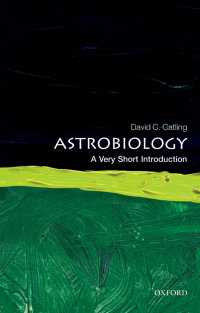- ホーム
- > 洋書
- > 英文書
- > Philosophy
Full Description
Henri Bergson was awarded The Nobel Prize for Literature in 1927. However, literary writers do not consider him — and in fact never cite him — as one of their own. Bruno Clément reads Henri Bergson as a writer whose thought is inseparable from a tireless reflection on the question of his written expression.
Clément adds new insights into Bergson's philosophical achievements through an analysis of the literary techniques he develops to express his theoretical insights. This close analysis of rhetorical technique analyses the effect on Bergson's philosophical texts. Reading all of Bergson's philosophical texts with the tools of literature, to systematically consider the theoretical consequences, he reveals that Bergson was not only a philosopher but a highly skilled and innovative writer.
Contents
Translator's Introduction
List of Abbreviations
1
"In other words..."
An Author's Preface
How to Write
The Distinction of a Poet
Penetrating the Veil of Words
Thought and Language
Commentary on Bergson
Philosophy and Literature
The Form of Discourse
In Praise of Approximation
Of the Proper, Of the Image; Of the Figurative, Of the Concept
Forget Words
Three Figures
Zigzag
Giving Voice
To Fabulate
Thinking Through the Imagination
The Words of Philosophy, the Words of Life
Language and Reason
On Metaphor
Language and Continuity
Infinite Correction
Intuition, Image, Concept
Bergson's Languages
Language and Music
Care of the Symbol
Bilingual Bergson
Reading Bergson
2
"... in the same direction as art"
Art and Thought
The Measurable and the Unpredictable
Art and Science
Art is an Anti-Concept
A Question of Vision
Art and Philosophy
The Singular, the Universal
The Life and The Work
The Philosopher and his Model
To Philosophize as an Artist
Art, Empathy; Metaphysics, Sympathy
Photography and Translation
On Literary Composition
"We artists..."
The Essence of Art
Bergson Translator
Bergson Musician
3
"An Effective Fiction"
On the Imagination in Philosophy
The Imagination from a Semantic Point of View...
The Temptation of Fancy
The Imagination, from an Anthropological Point of View
Fancy and Will
Generalized Invention
Circumstance is a Lure
Fiction is a Counter-Power
Evolution is a Fable
Bergson's Ghost Philosophy
London, just after Bologna
The "Ghosts which Surround Us" and the "Phantasms of the Living"
"The Little Girl and the Learned Doctor", Fable
The Creatures of Dream
"... a dream I indulge in at times..."
"... perhaps even death"
Literature and Philosophy mixed
The Mediating Figure [image] in the Carpet
Henri, Henry and William
Philosophy and Philosophy
Philosophy and Literature
Literature and Literature
Critique of the Imagination, Critique of Bergson
4
"... to transfer thought, still living, into the soul of another"
Coincidences
Teaching
In Praise of the Hand
Jeanne
Teaching literature
To Hell with Meaning, to Hell with Doctrine
"The Spirt of Form"
To Teach Philosophy is to Philosophize
To Philosophize is to Teach the History of Philosophy
Time and Narrative
Bergson, Among Many Others
For a Written Philosophy, Despite Everything (Plato)
The Textual Aporias of Pure Reason (Kant)
"Words, words, words..."
Thought is Circumstantial...
... figural...
... and textual
Works Cited
-

- 電子書籍
- 亡国のマルグリット【分冊版】 37 プ…
-

- 洋書電子書籍
-
VSI宇宙生物学
Astrobi…





